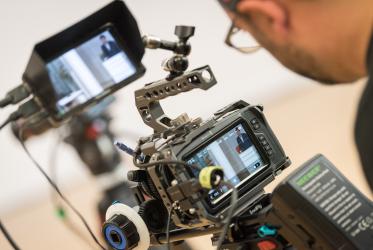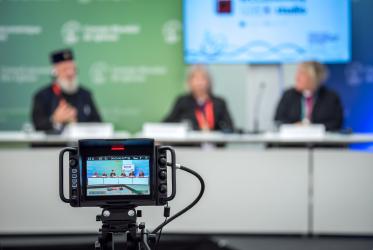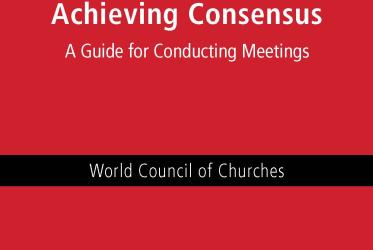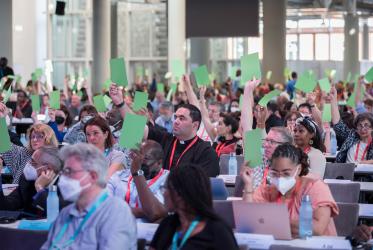1. Introduction
As the Programme Committee began its work, the moderator Rev. Fr Dr K.M. George reminded the committee that these were its last meetings. He spoke of a story from the traditions of the early church of a desert mother, "amma" who never went any where, but who on being asked what she was doing there, answered "travelling". In this spirit the committee began its work.
The tasks of the Programme Committee in its sessions before and during the Programme Committee are:
1. Receive and comment on the programme highlights 2004 (Gen 06).
2. Receive and comment on the reports from the commissions, the Bossey Board, the advisory group and the reference groups; and receive and comment on self-evaluations conducted by some of the consultative bodies. To discuss the report "From Harare to Porto Alegre" (Gen 07), receive comments from other committees and present recommendations to Central Committee.
3. To discuss the report on the Pre-Assembly Programme Evaluation (Gen 08), receive comments from other committees and present recommendations to the Central Committee.
4. Discuss matters related to the consensus methods/changing rules of debate.
5. Consider matters arising from the reports of the officers, the moderator and the general secretary, in relation to programmes and forward comments to other committees.
6. Propose recommendations for the work of the Programme Guidelines Committee at the 9th assembly.
7. Other pertinent items that emerged needing Programme Committee consideration.
As in the past, the Programme Committee sought to work in a creative way. It divided into three groups for a detailed discussion of reports and as a means to enable many voices to be heard. The small group format was essential given the time constraints of the meeting as well as to facilitate the full participation of the committee. However, this was at the expense of all persons fully discussing each matter.
2. Programme Highlights 2004 (Doc GEN 06)
The Programme Committee received a power point presentation illustrating Doc Gen 06. Given the full report of all programmatic work since Harare that is before the Central Committee this document only gives highlights of programme work in 2004. The Programme Committee received the report and commends it to the Central Committee for their information.
3. Reports from Consultative Bodies
The Programme Committee received ten summary reports from consultative bodies. It expressed its gratitude for the faithful work done by these bodies in assisting programme directions, implementation and evaluation, and it recognized that, as these were summary reports, far more work lay behind them. It recognized that some of these bodies, namely the Commission of the Churches on Diakonia and Development, the Commission on Justice, Peace and the Integrity of Creation, and the Reference Group on Inter-religious Relations and Dialogue, formed at the Central Committee meeting of 2003, had met for the first time since the restructuring of the programmatic work into 13 core programmes and two international ecumenical initiatives.
The Programme Committee continues to express its unease at the reality that it struggles to have a full overview of all the programmatic work due to its own limited meeting schedule. The methodology of working in small groups and receiving only summary reports means that few Programme Committee members have a full grasp of many programmes. It further notes that Central Committee members have even less opportunity to grasp the breadth of programme work. It encourages Central Committee members to ask for the appropriate Programme Committee report from a consultative body when a person wants to know more and to network with the relevant staff team.
3.1 Reference Group on the Decade to Overcome Violence (PRO 1)
The Programme Committee received the report and appreciated the extensive achievements of the DOV during the first half of the Decade. The practice of deciding on the focus well over a year ahead of time has proven very helpful for planning and preparation with churches in the region. The annual focus for 2006, previously approved by the 2003 Central Committee is on Latin America, where preparations are already underway.
The Programme Committee recommends:that the Central Committee adopt the following regions for forthcoming years, with specific aims, content and themes to be developed in conjunction with regional partners:
<typolist>
2007: Europe - this coincides with the third European Ecumenical Assembly for Justice, Peace and the Integrity of Creation.
2008: Pacific Islands - The Assembly of the Pacific Conference of Churches, scheduled for late 2007, will be the opportunity to launch the focus.
2009: The Caribbean - acknowledging the Caribbean as a distinct region in the Americas will strengthen the Caribbean churches in their efforts around the DOV.
</typolist>
This pattern will mean that the DOV annual focus will have covered every region, as a whole, as a sub-region, or with a particular country.
The Programme Committee recommends:
a continuation of the DOV-Reference Group for the second half of the Decade (beyond 9th assembly), and requests the Executive Committee (September 2005) to oversee the appointment process.
The Programme Committee affirms that a DOV intern be hired in the region of the focus for the respective year to work with the REO and the regional task force set up for the focus.
The Programme Committee affirmed the proposals to have special youth participation on DOV-efforts at the 9th assembly (together with the Central Committee Youth programme); to stress youth in the 2006 Latin-America-focus and in the second half of the decade; and the clear profile for DOV planned at the CWME conference in Athens in May 2005.
3.2 Commission of the Churches on Diakonia and Development (PRO 2)
The Programme Committee received the report of the first meeting of the Commission on the Churches on Diakonia and Development. The Programme Committee noted that the commission intends to look for ways to highlight the transformational nature of diakonia at the WCC assembly; to undertake an in-depth analysis of the changing context of diaconal and development work. The Programme Committee noted that the commission also had ideas of work to forward to the Assembly Planning Committee for various parts of the programme of the 9th assembly.
3.3 Commission on Justice, Peace and the Integrity of Creation (PRO 3)
The Programme Committee received the report. In addition to the focus on economic globalization, the group highlighted the need to continue to involve youth in ever more visible ways, to continue to consider the role of women and their contributions, and it expressed appreciation of the other activities under the commission's care such as Indigenous Peoples, Ecumenical Disabilities Advocates Network, Communication, Racism, Caring for Life, etc. The Programme Committee identified that important work was being done on the impact of economic globalization upon women.
Special attention was given to the new AGAPE Process (Alternative Globalization Addressing People and Earth) included in an attachment to the commission report. The Programme Committee amended the recommendation from the commission and recommends the following to the Central Committee for adoption:
AGAPE Process (Alternatives to Globalization Addressing People and Earth). The Programme Committee welcomes the efforts made to engage the churches in the AGAPE process and in the work done since Harare on economic globalization.
The Programme Committee recommends that the Commission on JPIC prepare a Call to Action (based on the AGAPE process) addressed to the churches for their study and follow-up. The Programme Committee recommends that the Executive Committee consider and approve the call in September 2005.
That the AGAPE Call, which is prepared as a prayer, be at the heart of the Assembly Plenary on Economic Justice for continued action by the churches.
3.4 Commission of the Churches on International Affairs (PRO 4)
The Programme Committee received the report. The Programme Committee recognizes the growing consciousness of member churches, specialized ministry, and ecumenical organizations to be engaged in advocacy to influence the policies of governments and inter-governmental organizations. The Programme Committee acknowledges the efforts made to develop further the UN Advocacy of the WCC.
The Programme Committee was pleased to note the ongoing work as requested by Central Committee in September 2003 on deepening the ethical and theological reflection on the "Responsibility to Protect."
The Programme Committee further appreciated the methodology of working with regional foci without excluding the work on other conflict situations.
3.5 Reference Group on Inter-religious Dialogue (PRO 5)
The Programme Committee received the report. In particular it welcomed the convening of an international inter-religious conference in June 2005, noting that nowadays the holding of inter-religious dialogue is considered essential but the implications need attention.
3.6 Bossey Board (PRO 6)
The Programme Committee received the report from the Bossey board with appreciation for its positive direction and for the developments that have taken place in regard to its expanding academic programme, including the addition of the month-long programme on interfaith dialogue and encounter.
3.7 Faith and Order Plenary Commission and Standing Commission (PRO 7)
The Programme Committee received the report, noting in particular the Plenary Commission meeting held in Kuala Lumpur on the theme "Receive one another, as Christ has received you, for the glory of God" (Romans 15:7). It affirms the effort made in Kuala Lumpur to reflect on the search for Christian unity in a world marked by increasing religious and cultural pluralism. It appreciated the effort made to involve younger theologians in Faith and Order work.
In addition, the Programme Committee was reminded of the work being done on the Theological Reflection on Peace based in Faith and Order but touching many programmes. The Programme Committee noted that the texts of the major studies were being revised in light of the Plenary Commission discussions for presentation to the Standing Commission meeting in June. The Statement on Ecclesiology will be coming to the WCC 9th assembly.
3.8 Commission on World Mission and Evangelism (PRO 8)
The Programme Committee received the report, noting that the preparations for the World Mission Conference in Athens, May 2005, were well underway and that participant lists were now closed. Major preparatory documents on mission as reconciliation and mission as healing are available on the website. The Programme Committee agreed that it is important that the outcomes of the Conference be shared widely within the WCC and that careful note be taken as to programmatic suggestions following the conference.
The Programme Committee affirmed the commission's intention to continue to seek to widen the CWME membership in accordance with its by-laws.
The Programme Committee noted that the commission believed it was important to be involved in the preparation for the marking of the centennial of the 1910 Edinburgh Conference whilst recognizing that many organizations, including the WCC and the Lausanne movement, will want to be involved.
The Programme Committee recommends:
that the Central Committee affirm the importance of the WCC, including the CWME, in marking the centennial of the 1910 Edinburgh Conference.
The next World Mission Conference may or may not be part of the same event, but the commission envisages that it will need to take place in 2010. In light of this the commission expressed the need for continuity of its work so that there would not be a delay between the assembly and the appointing of a new commission.
The Programme Committee recommends:
that a continuing core group of up to six serving commissioners, re-nominated by their churches, affiliated bodies or wider constituency organizations, be appointed by the WCC Executive meeting in Sept 2005/or by the new Central Committee meeting at its first meeting immediately after the assembly. The remaining twenty-four members of the commission would be appointed by the normal time schedule.
3.9 Commission on Education and Ecumenical Formation (PRO 9)
The Programme Committee received the report and affirmed the significance of ecumenical formation for the future of the ecumenical movement as one of the primary means to preserve and enhance the present and future health of the ecumenical movement.
3.10 Communication Advisory Group (PRO 10)
The Programme Committee received the report and affirmed the general direction of the first draft of the WCC post-assembly communication strategy framework. Believing that it is important that the development of this work not wait until after the assembly the Programme Committee recommends:
that the Executive Committee (2005) give consideration about how to follow through with a communication strategy framework and to give consideration to matters around language policy.
The Programme Committee recommends:
that a clear strategy for the dissemination of information via e-mail (mailing-lists), especially for the Central Committee-members, be adopted.
3.11 Consultative Bodies and the Internal Evaluation Process
The Programme Committee meeting in 2003 had requested all consultative bodies to evaluate their own work using guidelines set by the Programme Committee. It expressed its gratitude to those bodies that had undertaken such an evaluation, namely the Bossey Board, the Commission of Education and Ecumenical Formation, and the Commission on World Mission and Evangelism, together with the progress-report endorsed by the Communication Advisory Group, and comments from the Plenary and Standing Commissions of Faith and Order concerning their workings.
The Programme Committee noted that the Faith and Order Commission was requesting the opportunity to meet twice between WCC assemblies to allow for the introduction of commissioners to the work and style of working and so to contribute effectively, and to give greater focus and depth to the work. The Commission on World Mission and Evangelism had also noted that the infrequency of meetings (once every eighteen months) made it difficult for adequate direction setting, monitoring and evaluation of activities. The Conference Planning Committee had met much more frequently and its members were far more engaged with the commission.
The Programme Committee recognizes that the increasing frequency of meetings has budgetary implications. It also recognized that where consultative bodies have their own constitution and by-laws and a wider constituency than the WCC, any changes have to be agreed by all parties and made in accordance with such by-laws.
The Programme Committee recommends:
that the new Central Committee give consideration to the frequency of meetings of consultative bodies and explore a process of amending by-laws to allow for greater flexibility.
The Programme Committee noted that both the Commission on World Mission and Evangelism and the Commission on Education and Ecumenical Formation saw no benefit from the two staff teams having been merged into one team dealing with two programmes and two commissions. Both commissions affirmed that the work of education and ecumenical formation related to all areas of the Council's work.
4. Report From Harare to Porto Alegre" (Doc GEN 07)
The Programme Committee received the draft document From Harare to Porto Alegre. At this point, it offers to Central Committee some information on the background to the report and general comments concerning the presentation, the timeline and the introduction to the text. Central Committee members are invited to engage with a process of further comment later this week as individuals and through the meetings of the various committees of the Council.
4.1 Background
The purpose of the report is to present to the assembly in an integrated, concise and readable way the work of the Council during the years between assemblies. The member churches, delegates to the WCC 9th assembly, and all those with a general interest in the work of the WCC are the intended audience. Thus the report is to focus on the meaning and achievement of the programmatic activities without presenting all of the detail. The hope is to present the breadth of the work of the Council and the way in which so many programmes are interconnected. Sources for the report were:
<typolist>
"Together on the Way," the report of the Harare assembly;
minutes and reports from the meetings of the Executive, Central Committee Commissions, and Advisory Groups since 1998;
reports written for staff teams, funding partners;
annual reports, press releases and website information.
</typolist>
The final document will include pictures.
4.2 General comments
The Programme Committee welcomed the report and expressed gratitude to the compiler. It believes that it is important to present an integrated overview of the programmatic work of the WCC in a descriptive and accessible style. It hopes the prose can be as inspiring as possible. (Some sections achieved this whilst others did not.) One possibility would be for each chapter to start with a brief, inspiring summary or illustration.
In its draft form, the report blends the text's narrative with "side stories". This terminology is not intended to suggest that the content is marginal or secondary to the report. In fact, the opposite is true. These sections will be highlighted in the final report as a way of drawing particular attention to them.
The Programme Committee believes that the whole document would be improved by a clearer Table of Contents and the inclusion of an Index. Specifically:
<typolist>
For the sake of clarity and ease of those not familiar with changing terminology of programmes, the Table of Contents needs to include some of the historic terminology of the Council so that it reads, "Building the Unity of the Church - Faith and Order" and "Witnessing to the World -Mission and Evangelism".
Sub-headings from throughout the report could be used in the Table of Contents to enable the reader to see the flow and breadth of the report.
It may be that the Appendix which lists staff teams should be within the Table of Contents.
An Index would allow an interested party to quickly see all the programmes and activities that might relate to a particular group or theme such as working with Pentecostals, climate change, etc.
</typolist>
The Programme Committee recommends:
that the report From Harare to Porto Alegre be published in July 2005.
This date allows time for the finalization of texts from the Faith and Order Plenary Commission by their Standing Commission meeting in June 2005, a report from the Mission and Evangelism Conference in May 2005, and a report from the Inter-Religious Conference in June 2005. The Programme Committee does not believe it is helpful to write these sections in advance nor to exclude reports from these meetings.
4.3 Further Process
In the light of this introduction and these comments, Central Committee members are requested to reflect further on the report both individually and in committees. Such reflections may include:
<typolist>
Sharing comments on the scope and integrated approach of the Report.
Identifying any major programmatic information during the last seven years omitted from the Report.
</typolist>
Suggestions for amendments to any sections of the report should be given in writing to the rapporteurs of Programme Committee (Ruth Bottoms or Bruce Robbins) by Friday at 6 p.m. This will enable the Programme Committee in its second phase of work to bring further recommendations to the Central Committee.



